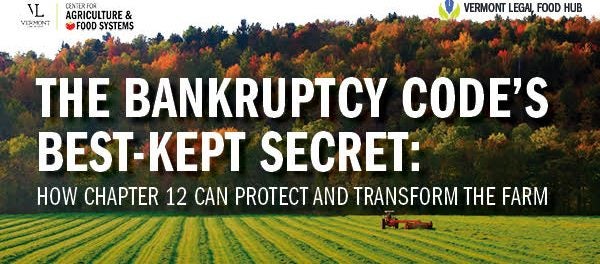Farm Bankruptcy Relief Presents Opportunities

The Bankruptcy Code’s Best-Kept Secret How Chapter 12 Farm Bankruptcy Relief Can Protect and Transform the Farm
Vermont Law School’s Center for Agriculture and Food Systems and the U.S. Bankruptcy Court invite you to an upcoming webinar on farm bankruptcy relief.
Friday, November 6
12 to 1:30 p.m. ET
Via Zoom; register here
While farm bankruptcy is often associated with negative connotations, filing for Chapter 12 relief can also present opportunity for farmers. Not only can it help farms avoid or recover from financial distress; it can also help save taxes due when transferring a farm, and greatly expand farmers’ options to sell, transfer, or transform their operations.
If you or your organization advises, loans to, or works with farmers, join our free webinar to learn about this potent yet under-utilized tool. A panel of experts will share how the Chapter 12 option works, equipping you with information essential to advising the agricultural community in any state.
Panelists Include:
Colleen A. Brown, U.S. Bankruptcy Judge, as moderator;
Jan M. Sensenich, Chapter 12 Trustee;
Peter Fitzgerald, Vermont Economic Development Authority; and
Rebecca Rice, a chapter 12 debtor’s attorney.
This educational event is brought to you by the Vermont Legal Food Hub, a joint initiative of the Conservation Law Foundation and the Center for Agriculture and Food Systems, with funding from the USDA National Agricultural Library. The Vermont Legal Food Hub connects farmers, food entrepreneurs, and food system organizations with free legal services.
The Center for Agriculture and Food Systems (CAFS) trains law and policy students to develop real-world solutions for a more sustainable and just food system. CAFS educates students at Vermont Law School through a comprehensive array of residential and online courses, as well as through the Food and Agriculture Clinic. Students can choose to specialize in Food and Agriculture Law; pursue a JD Certificate in Food and Agriculture Law; or earn a Master’s or LLM degree in Food and Agricultural Law and Policy. With CAFS’s diverse course offerings, degree options, and practical experiences in the clinic, students explore food and agricultural law from a variety of perspectives.








 Your Privacy Choices
Your Privacy Choices
Leave a comment